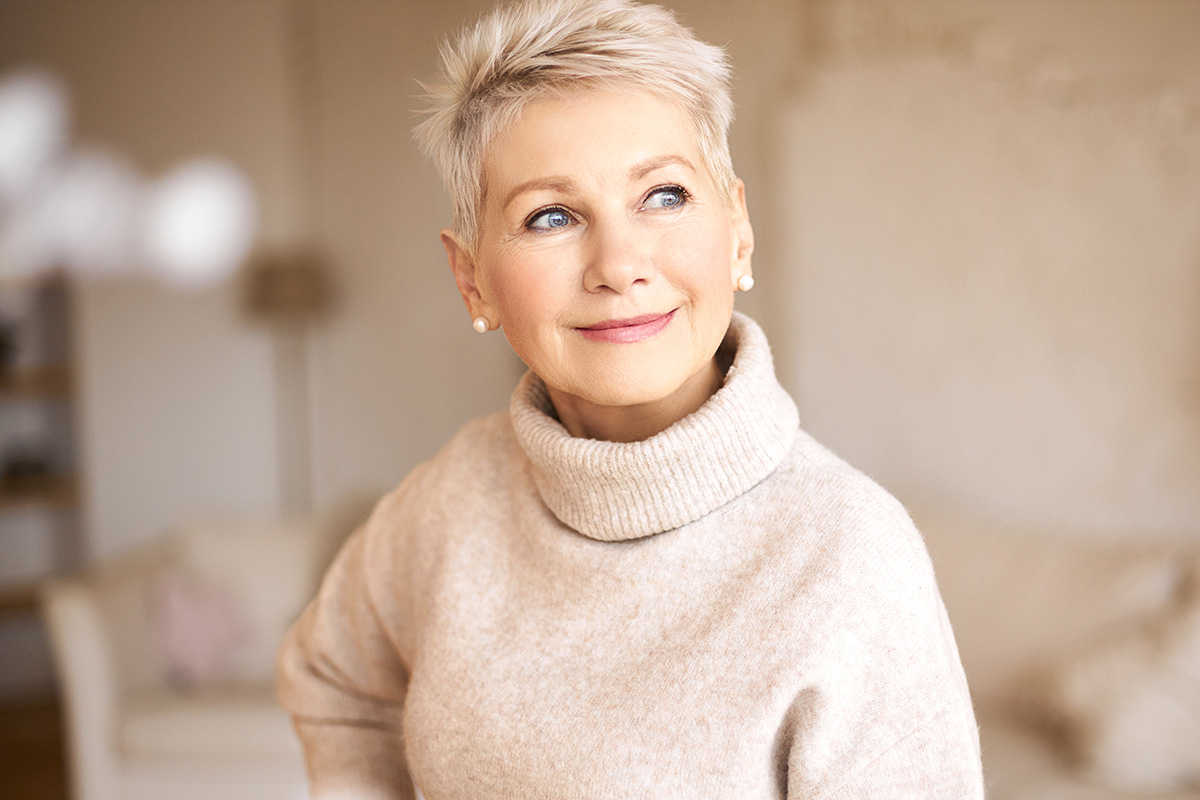Menopause: Symptoms and Natural Treatments to Maintain Your Youth
Menopause is a term we either love or hate.
We love not having to deal with ugly periods and the discomfort that comes with it. Yet we hate the idea of menopause, as fertility also means “Youth.” When we cannot bear children anymore, psychologically, that usually also means we are “old” or “dried up,” and we have crossed over to the “other side.”
Like wrinkles and age (and the increasing desire to sleep early and stay away from crowds!), menopause is an inevitable—and completely natural—thing that affects all women: thinning skin with more wrinkles, dryness, gaining fat, and aging faster.
For those of you who have not experienced menopause but are concerned as you are getting closer to this big change, it can be a little stressful not knowing what to expect, or how to manage this phase well.
In this article, we’ll talk about common menopause symptoms, how they can change your body inside and out, and natural solutions to keep you looking and feeling great.
For those of you who have already experienced menopause, we are here to share one of the biggest concerns facing all women: we still want our youthful skin and body, thick hair, just without the menopause symptoms, please!
Can you still have your youth without the monthly hassle?
Absolutely! 50 is the new 30. 70 is the new 50. Read on to discover!
The Onset: When is the Menopause Age Range?
Menopause is defined as the end of a woman’s menstrual cycle. The average age when menopause begins to occur for women in the United States is 51.
When does menopause start? For some women, it can start as early as in their 40’s, while others may experience it in their late 50’s.
The average of menopause is 48-55. If menopause occurs in women under 40, it’s considered premature or peri-menopause.
What Happens During Menopause?
Beginning in your late 30’s, your body begins to produce less estrogen and progesterone—the hormones that affect and regulate menstruation.
Estrogen is a sex hormone that promotes the development of our female body functions and characteristics, which include our menstrual cycle, fertility, skin collagen, and oil production.
As these hormones decline, so does your fertility. As estrogen declines, less collagen is produced. Collagen is the protein that gives your skin its elasticity and keeps it healthy.
How Long Does Menopause Last?
This can vary from person to person. According to the Cleveland Clinic for Women, this phase is described as when you stop having your period for one year.
Menopause Symptoms
First, the good news: menopause isn’t permanent and it’s not necessarily terrible for everyone. In some women, symptoms can be gone in as little as one year.
For other women, menopause signs may last even longer.
The point is, everybody experiences menopause differently.
In some cases, the symptoms may not be as bothersome for some women as for others. So, you never know where you’ll lie on the spectrum!
Even in the years leading up to menopause (peri-menopause), you can begin experiencing some of the symptoms associated with the condition.
Early signs of menopause or peri-menopause can include:
- hot flashes
- irregular periods
- night sweats
- issues with sleep
- menopause weight gain
- mood change, depression, anxiety
Whew! That’s a lot, isn’t it? But remember: you’re not necessarily going to experience all these symptoms, the severity depends on the person, and there are natural solutions.
How Menopause Affects Our Skin, Hair, and Body
Besides all the changes affecting our mood, sleep, and energy, menopause often affects the way we look, which can be challenging to deal with. In a society that prizes looks so highly, these changes may even cause stress or frustration.
The most drastic changes in appearance are caused by loss of collagen and decreased levels of estrogen.
1. Loss of Collagen Results in Thinner, Dry and Sagging Skin
Once menopause hits, collagen and elastin levels can go down drastically, as they are partly regulated by estrogen.
Since collagen and elastin are proteins that keep skin tight and smooth, their loss can and does greatly affect the appearance of skin, leading to common aging concerns like fine lines, deep wrinkles, and sagging along the jowls.
One of the ways to fight against this loss is to replenish your lost collagen with the best collagen supplement – like liquid collagen.
2. Loss of Calcium Increases Chances of Brittle Bones
One of the most perturbing effects of menopause is the loss of calcium. This is troubling because it can and does lead to osteoporosis, or brittleness in bones that may make them break or fracture much more readily. In fact, women can lose as much as 20% of their bone density about five years after experiencing menopause. This is caused by a decline in estrogen production, much like so many other symptoms of menopause.
Bone density can be preserved by exercise. Even walking a few miles a day or doing low-impact aerobics can be helpful, as can strength training. Diet can also help preserve bone density, Dark, leafy greens, milk, yogurt, cheese, legumes, and fish like salmon are all good sources of calcium.
Taking Calcium supplements with vitamin D can also help to prevent calcium loss.
3. Dry and Itchy Skin
Estrogen regulates collagen and oil production in our skin.
When estrogen and progesterone become depleted during menopause, this leads to a hormonal imbalance, increasing the presence of the male hormone androgen, and leading to such uncomfortable and undesirable effects as dry and itchy skin.
That’s why, as menopause approaches and estrogen production diminishes, dry, itchy skin becomes very common, says Elizabeth Tanzi, MD, co-director of the Washington Institute of Dermatologic Laser Surgery.
In the 5 natural treatment and solutions we have listed below, we will talk about plant-based estrogen that might just do the trick, as well as supplementing with collagen peptides and antioxidants.
4. Menopause Weight Gain
Getting frustrated with the extra fat and weight building up? And finding that it does not matter how little you eat, you just can’t stop the unwanted fat and weight around the abdomen and thighs?
Blame this on menopausal weight gain.
What causes menopause weight gain?
One culprit, again, is the hormonal changes happening during menopause. Also, as we age, our metabolic rate starts to drop. Together, these cause the frustrating increase our weight.
4. Hyperpigmentation
If you’re experiencing menopause, the sun might not be the only thing to blame for those pesky dark spots! Hyperpigmentation is another skin issue that can result from menopause.
Estrogen can regulate melanin production, so you can see why declining levels of estrogen in the body can cause hyperpigmentation, which is a result of too much melanin. Sometimes hyperpigmentation even affects expectant moms, because of hormonal shifts during pregnancy. Hyperpigmentation most often occurs on the face but can also affect the hands, chest, neck, and arms.
Furthermore, menopausal skin can often become more sensitive to sunlight. Melanocytes, cells that produce melanin, can decrease due to lack of estrogen, thereby creating less melanin to protect the skin from sunlight.
This can result in an overall lighter complexion in some cases, but also make it imperative to protect skin from sun exposure.
5. Hair Loss
Thinning hair is another less-than-desirable side effect of menopause. Estrogen and progesterone are believed to make hair grow faster and fall out much less frequently. As these hormones are reduced during menopause, hair may thin in certain areas, particularly at the top and sides.
The good news? It’s less likely that a woman will get bald spots like men do. The decrease in estrogen and progesterone also produces more androgens, which are a group of male hormones that can shrink hair follicles. Sometimes, androgens can even cause unwanted facial hair growth even as they cause hair on the head to decrease.
6. Dry Skin, Redness, and Itchy Skin
Dry skin in menopausal women tends to occur as a result of the thinning of the epidermis, which is a result of decreased blood flow from lack of estrogen and leads to trans-epidermal water loss (TEWL). As TEWL occurs, it can make skin appear less plump and radiant. Dry skin often also leads to a greater prevalence of wrinkles.
Hot flashes can also affect your skin, causing considerable warmth in the face and leading to redness. This can make one’s complexion look ruddy and uneven. Hot flashes are also accompanied with an overall heated feeling and profuse sweating.
Menopause Treatment: Can You Prevent and Reduce the Ugly Symptoms of Menopause?
We can take control of how we deal with this natural inevitable phase by fighting nature with nature.
Here are 5 natural solutions to help reduce menopause signs and symptoms:
- Plant-Based Estrogen to maintain healthy estrogen level
- Exercise to improve and maintain muscle tone and reduce body fat
- Best Collagen Peptides Supplements to increase and support skin collagen density
- Powerful Antioxidants to prevent and reduce hyperpigmentation
- Essential Oils
1. Soybeans—Nature’s Plant-Based Estrogen
Estrogen therapy has many benefits but the potential acute side effects and risk of breast cancer have many women wondering: Is this worth it?
The good news is Mother Nature offers natural plant-based estrogen—most commonly found in Soybeans—that have long been part of the Asian diet but are still relatively new here in the West.
In recent years, soybeans have been considered as a natural plant estrogen since they are one of the few food sources that is rich in a particular type of plant estrogen called isoflavones. These are compounds with a chemical structure similar to estradiol, the main estrogen produced by a woman’s ovaries.
If you want to substitute with plant-based estrogen, how much soy should you eat?
Dr. Messina suggests a minimum of 25 grams of soy protein per day. For comparison, people in Japan typically consume about 30 mg of isoflavones per day, mostly tofu. Good sources of isoflavones include whole soybeans, textured vegetable protein, soy flour, soy protein isolate, tempeh, and miso.
Benefits include:
- Reduced hot flush and symptoms from reduced estrogen
- Prevents calcium loss and reduces the risk of breast cancer and osteoporosis
2. Exercise
Exercise is great for preserving bone density, improve circulation and increase muscle tone.
Even walking 30 minutes a day or doing low-impact aerobics can be helpful, as can strength training. High-intensity workouts are especially beneficial as they trigger the release of the ‘happy hormones’—the feeling of being ‘high’, which can help to fight menopausal anxiety, depression, and moodiness.
Benefits of exercise include:
- Increased muscle tone
- Reduced fat and weight
- Improved circulation
- Promotes happy hormones which can help fight hormonal imbalance
3. Collagen Peptides Supplement to Slow Down the Loss of Collagen, Thinning Hair, and Accelerated Aging.
One of the most effective methods to replenish your continuous depletion of skin collagen is by supplementing with collagen peptides.
Clinical studies show taking 10,000mg collagen peptides daily can help to reduce wrinkles and improve skin collagen density.
When you consume JBA Collagen, its high potency triggers the body’s ‘wound repair’ response, which activates fibroblasts (specialized cells that produce collagen) to start producing new collagen. Discover how JBA Collagen can transform your skin.
Benefits include:
- Firmer, fuller, and more radiant skin
- Thicker hair and nails
- Visibly reduced fine lines, wrinkles, and sagging skin
- Improved elasticity
- Helps prevent uneven pigmentation
- Skin Healing and eczema
4. Antioxidants help reduce hyperpigmentation and age spots
Formulated with L-Glutathione, vitamin C, and other ingredients that work together to combat hyperpigmentation, uneven skin tone, age spots, and signs of aging that can make a complexion look dull.
Results:
- Visibly reduces uneven pigmentation
- Lightens brown and dark spots on skin
- Lighter, fairer, luminous skin

